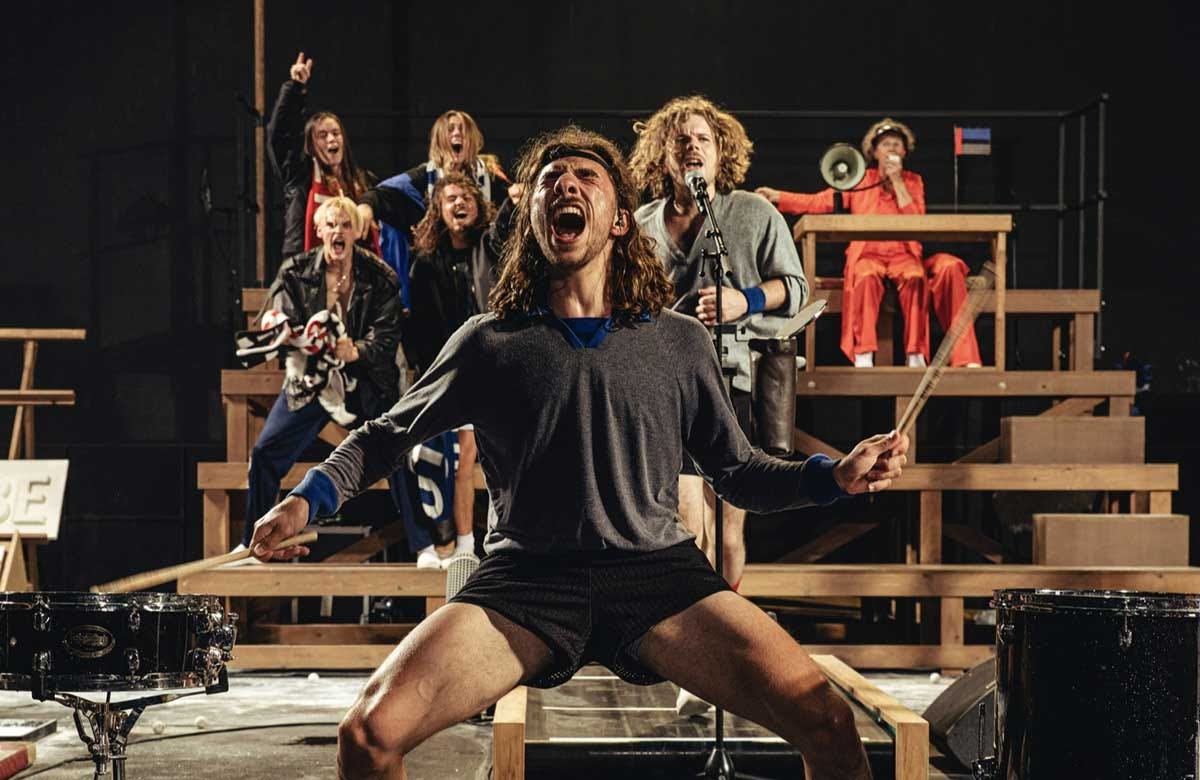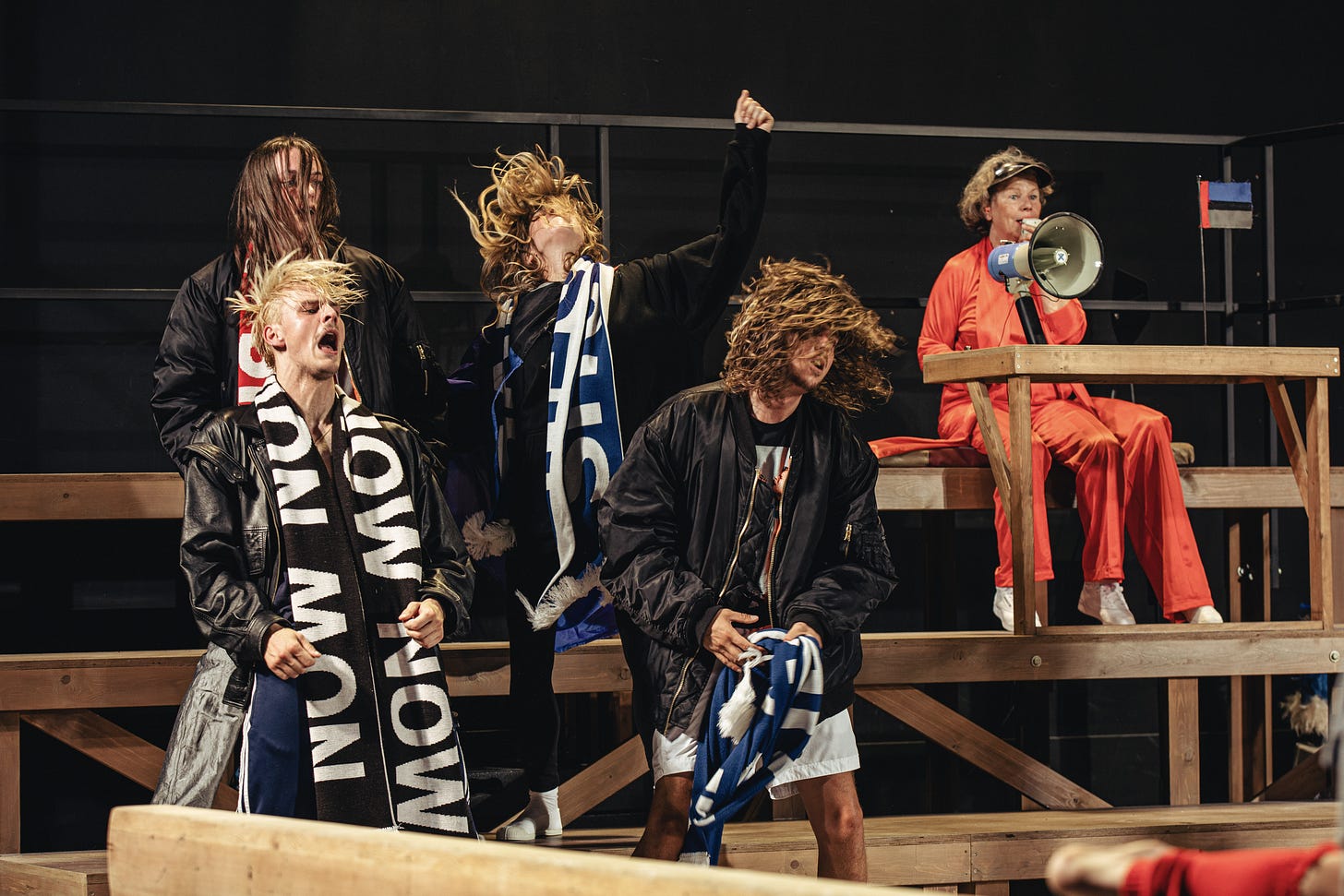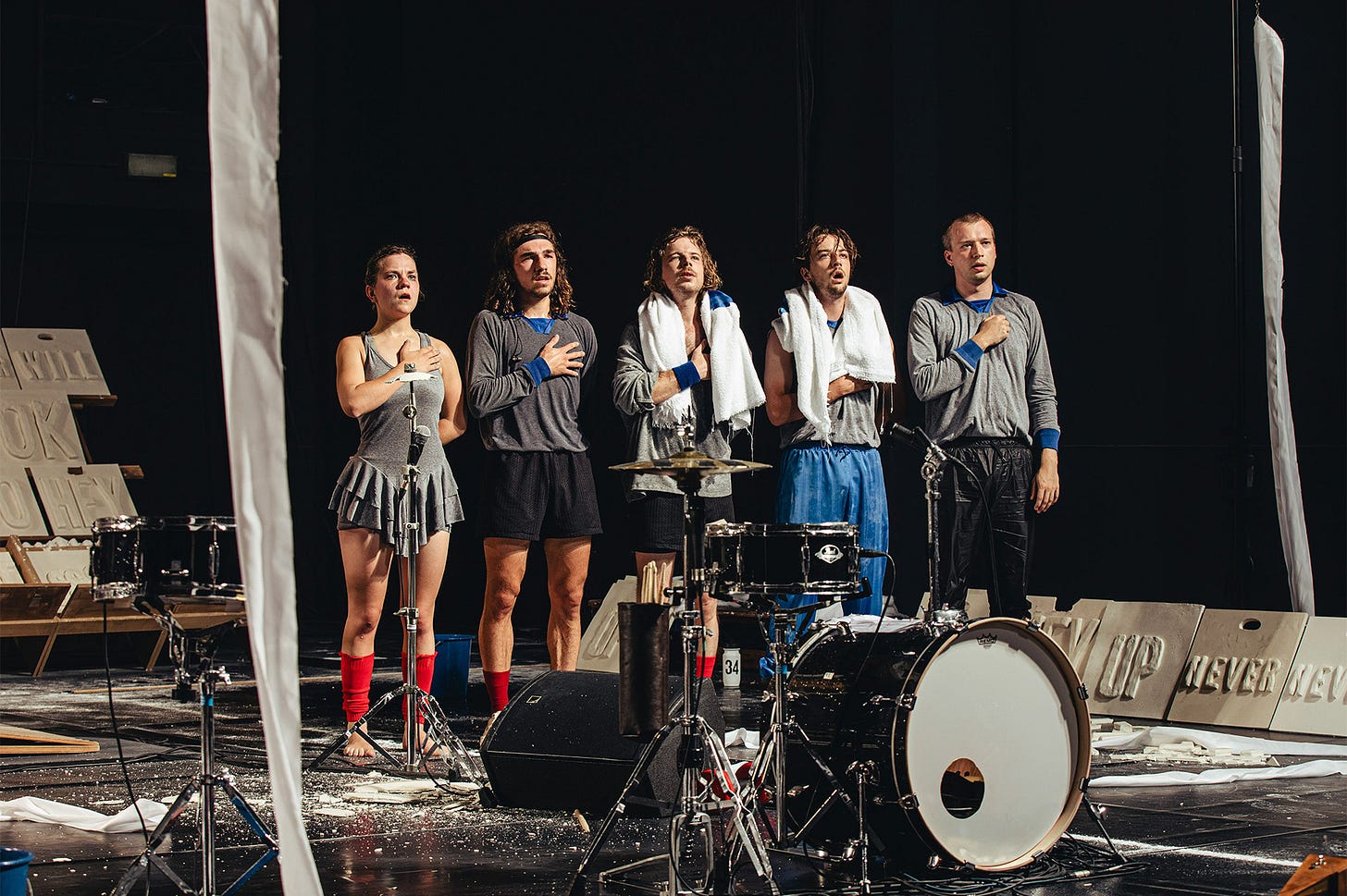Play it again: Sweat, repetition and Miet Warlop's One Song
On the Belgian artist's exuberant and moving fusion of music and sport.
Welcome to Café Europa, a new-ish weekly newsletter dedicated to European theatre. Here, you can expect a mix of in-depth reviews, profiles of artists and festival coverage.
Hello to all my new subscribers and thank you to my new paid subscribers, it really makes a difference and will allow me to expand my coverage. As is the way these days, I also have a Ko-fi account. I want to keep as much of the content free as possible, so all donations are very welcome. And if you find this newsletter valuable and think others would too, please do spread the word.
I recently attended the Belgrade International Theatre Festival (BITEF) – you can read my round-up here in The Stage - but before that I found myself in Paris to catch Miet Warlop’s One Song, of which more below.
“Knock, knock
Who’s there?
It’s your grief from the past.”
We hear these words a lot during Miet Warlop’s One Song. They reverberate through the piece, sung over and over by a performer who’s own breathing becomes increasingly ragged as exertion takes its toll on him.
Warlop’s show puts its performers through the wringer. As the title suggests, One Song, which premiered to great acclaim at last year’s Avignon Festival - is structured around a single song, composed by Maarten Van Cauwenberghe, which the cast perform repeatedly over the course of one hour.
Performing on a set that looks like a sports hall, with crash mats and bleachers, the cast play their instruments while performing feats of stamina and strength. The keyboardist has to bounce up and down on a springboard in order to reach the instrument suspended above his head. Similarly, the guy playing the cello does so while lying on his back and performing a series of strenuous sit-ups. The violinist perches on a balance beam. The drum kit is dispersed around the stage, so the drummer has to dash from drum to drum. The vocalist jogs on a treadmill. Every time they reach the end of the song, they begin again, stuck in an endless loop, their energy levels impressively high, for the first half at least, but the tiredness soon begins to show on their faces and sweat soon starts to discolour their grey sweats.
Warlop makes great physical demands of her performers. They are need to be strong musicians but also incredibly physically fit. They also need to understand and embrace the work she is making.
The musicians share the stage with a quartet of supporters in outsize football scarves, who cheer them on and dance along, while a judge/announcer figure in a vermillion jumpsuit mumbles incomprehensibly into a loudspeaker, and a man in a brilliant white cheerleader’s outfit complete with pompoms thrusts and spins in the background.
It’s a tremendous feat of performance and co-operation, a fusion of rock gig and team-sport, genuinely exhilarating to watch. The energy with which they all perform, so vigorous to begin with, starts to fade over the show, the effort become more visible as their faces redden and their hair become wet with sweat.
Belgian theatre maker and visual artist Miet Walop’s work straddles form, encompassing both performance, music and installations. Her 2009 show Springville was a sort of chaotic human cartoon in which the costumes and the props took on a life of their own. Tables sprouted legs and run around. A pair of trousers became sentiment. It was full of eruptions, explosions and pratfalls. Her 2016 show Fruits of Labour sits on the cusp between gig theatre and performance art, while her 2017 installation Amusement Park saw her fill the Arts Insitution Vooruit in Ghent with inflatable plastic tubing, which spilled from the windows like intestines.
One Song was the fourth instalment of the Histoire(s) du Théâtre series of commissions from NTGent. The title is a reference to the documentary Histoire(s) du Cinéma by Jean-Luc Godard, an overview of European cinema. NTGent invited directors to produce a work that in some way reflected on theatre as an art form. The first part of the series Milo Rau’s harrowing La Reprise premiered at the KunstenfestivaldesArts in Brussels in 2018. There have been subsequent instalments by Congolese choreographer Faustin Linyekula and Spanish director Angélica Liddell. Tim Etchells will present their fifth work in the series, How Goes the World, in November.
The show both consists of repetition and is itself an act of repetition, with Warlop revisiting of her first show Sportband/Afgetrainde Klanken. Made in 2005, this earlier show was created as a requiem for her brother, who had recently passed away. A mixture of jazz improvisation and sports imagery, it was a piece made at a time of loss and emotional rawness. Now almost two decades later her relationship with that loss has evolved just as her work has evolved.
As she explains in this interview:
I’m exploring the idea that my artistic practice is cyclical, that it is an ongoing process, a living research that becomes itself a character. I like it when the traces of the past are visible in the work in the present. That’s why the metaphor used in De Sportband as a requiem for my brother can be read as a palimpsest in ONE SONG. Between those two moments in my life as an artist, there are twenty years of artistic practice and personal experiences.
So One Song builds on Sportband’s themes and imagery, restaging the formerly freestyle piece with composition and choreography. The song may stay the same throughout but the tempo regularly shifts. A metronome is used to slow things down or speed things up and the performers follow suit. At one point this becomes a kind of struggle with one musician slowing things down, another speeding things up. Warlop adds other elements into the mix, clouds of chalk dust or water splashing down from the ceiling. On one occasion, the poor vocalist - Warlop’s regular collaborator Wietse Tanghe - is pelted with ping pong balls which he manages to valiantly bat into the crowd. But the biggest obstacle they face is time and their own finite reserves of strength. It becomes harder and harder to keep going but go on they do.
That’s part of the beauty of the show, the way it evokes the shit life throws at you and the pain you accumulate over the years. It’s at once possible to appreciate it on this metaphorical level and to enjoy the exhilarating thrill and full-throttle physicality of the performance. The cast hurl themselves into it, balancing on one leg, rolling on the floor, turning in endless circles, as continents of sweat form on their gym kits. (This show is the antithesis of that weird disconnect you get when actors performing in costumes under bright lights are obliged to ignore the inevitable bodily consequences - the sweat here is almost part of the scenography in its own right).
The show also reflects on connectedness. The supporters are ever present, bopping along, urging the performers on, and getting increasingly knackered themselves. This seemingly extends to nations. A flag hangs over the stage and at the end they sing a hymn, united beneath it, part of a bigger system. (If this sounds a little dry, it’s worth saying that Warlop’s work is very witty and playful and when ping pong balls started flying at the vocalist, I did an actual guffaw). It is, Warlop has said, a show designed for sharing and the audience is part of this community, engaged in the athletic spectacle before us.
The whole thing is at once joyous and, at the same time, quite profound and moving. Existence as ear-worm. We watch these people test themselves, push themselves to the edge and over, strain and pant, stumble and pick themselves up, pursued by the one thing no one can outrun.
Towards the end, inevitably, things get harder and messier, as they are wont to do. The cheerleader, Milan Schudel, who occasionally wears a wig that cascades over his face (a recurring motif in Warlop’s work), arranges a series of white tiles around on the stage. The tiles have words on them - ‘do’, ‘will’, ‘never’ - but they don’t form coherent sentences. You can see the effort etched on their faces. The cheerleader hums to himself as he spins on the spot. The performers look on the point of collapse, but still they sing. Still they sing. Until, one by one, they tumble.
You could slot One Song into the school of endurance art which explores the toll of performance. It reminded me of A Lot of Sorrow, a piece by the Icelandic performance artist Ragnar Kjartansson, who, in 2013, convinced rock band The National to perform the song Sorrow from their album High Violet, over and over again in a loop spanning six hours. During this time, they performed the song 105 times. In the resulting film, you can see the fatigue setting in as the hours pass and their playing subtly altering to accommodate their changing physical state. Warlop’s One Song does all that in fast-forward and is arguably more powerful for it.
Festival d’Automne - Paris’ autumnal arts bonanza
I saw One Song as part of the Festival d’Automne à Paris, a multi-disciplinary festival of the contemporary arts which runs every year from September to December. The show was performed at the Théâtre du Rond-Point, just off the Champs-Élysées. The 2023 Festival d’Automne programme will include a focus on the work of Susanne Kennedy – whose most recent show, Angela (a Strange Loop) I reviewed for The Stage earlier this year – and Nadia Beugré. The wide-ranging programme also includes Julien Gosselin, Phillippe Quesne, Australia’s Back to Back Theatre and the world premiere of a new work by US playwright Richard Nelson, he of Apple Family Plays fame. Our Life in Art is subtitled ‘conversations between actors from the Moscow Art Theatre during their tour in Chicago, Illinois in 1923’ and will explore the impact of Constantin Stanislavski and his Moscow Art Theatre troupe on US theatre. It premieres in Paris in December.
Warlop’s One Song performs a victory lap in Paris in January 2024. But UK audiences can see One Song at Leeds Playhouse from 19 - 20 October as part of the reliably exciting international festival Transform 23, and at Battersea Arts Centre, London, from 24-26 October, as part of a wider European tour (details here). If it wasn’t already apparent, I would recommend you see it.
This week in European theatre
FNT – Festival of National Theatre – The 33rd edition of Bucharest’s National Theatre Festival will take place between 20th and 30th October 2023. This year’s programme includes Radu Afrim’s epic collage Seaside Stories, a Romanian production of Breach’s It’s True, It’s True, It’s True by ACT Theatre and guest performance by Avignon Festival director Tiago Rodrigues, with Catarina and the Beauty of Killing Fascists, and Tim Crouch with Truth’s a Dog Must to Kennel.
The Caucasian Chalk Circle – Rimini Protokoll’s Helgard Haug collaborates with Theater HORA, a Swiss company consisting of artists with learning disabilities, for a fresh take on Brecht’s text exploring issues of care and family. Premiering at the Salzburg Festival this August, the show comes to Staatstheate Mainz this week as part of the Limitless Culture festival of work by artists with disabilities, the programme for which also includes RambaZamba Theater’s One Flew Over the Cuckoo's Nest and UK dance company CandoCo.
Kosovo Theatre Showcase – This year’s showcase programme, which also coincides with the IETM Caravan, includes The Shadow Garden, a work by UK playwright Sarah Hehir and director Nastazja Domaradzka based on true-events, as well as performances from theatres around the country and guest performances from Serbia. The showcase takes place from 24th-29th October. I’ll be there and will covering the programme in a future edition of Café Europa.






